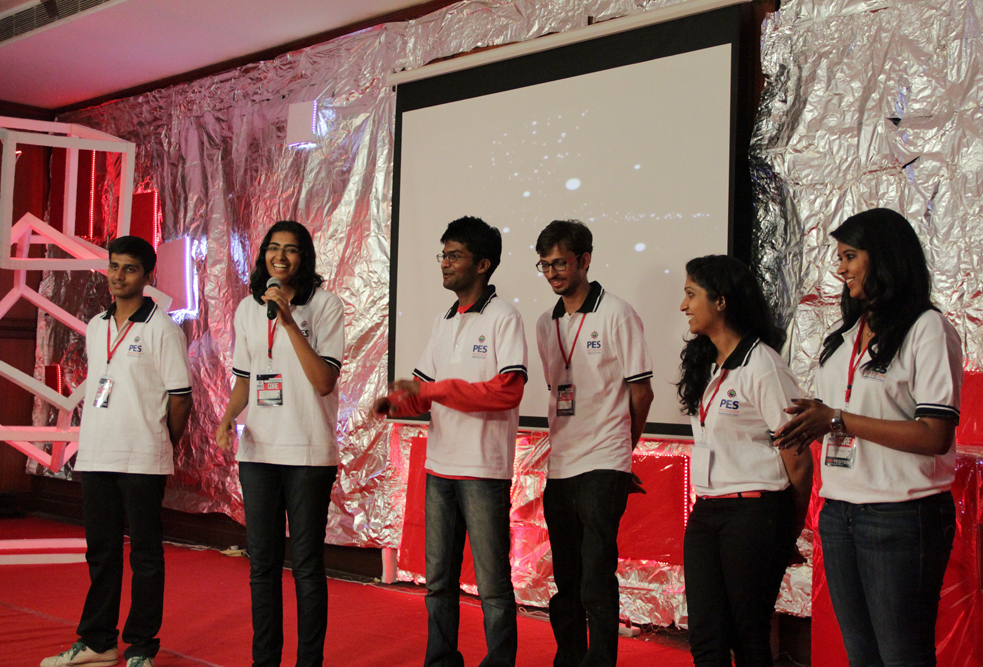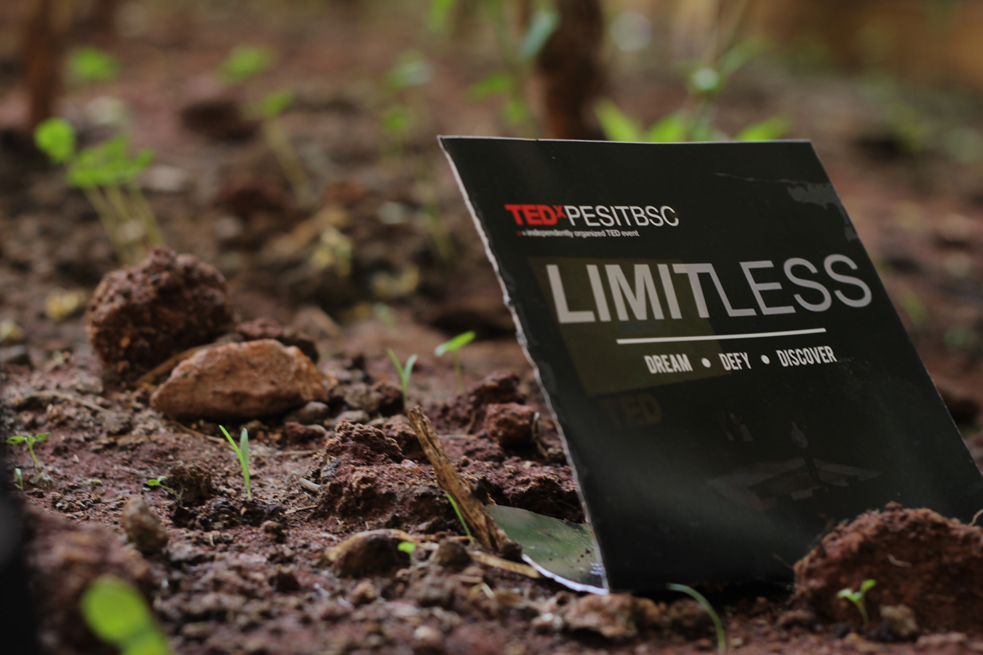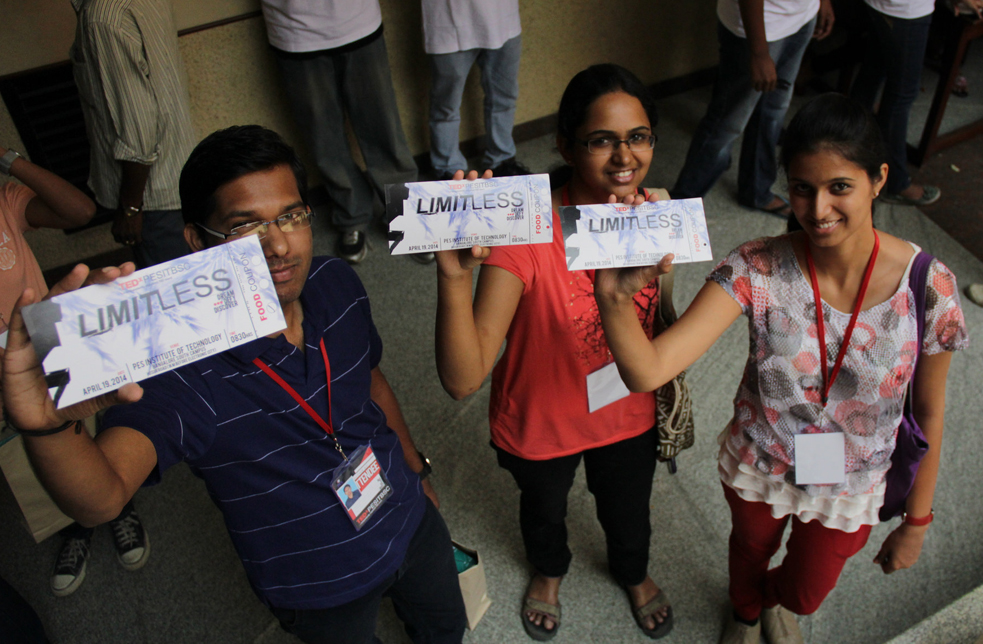
Seema Raman (near left) holds a mic on the TEDxPESITBSC stage.
TEDx organizer Seema Raman has held three events in the past year, and traveled from her home in Bangalore to the snowy mountains of British Columbia to learn more about putting on great events. But the funny thing is: Raman never intended to organize anything at all.
Raman, a 20-year-old engineering student at PES Institute of Technology—South Campus, was excited to learn last year that something called a TEDx event was taking place near her home in Bangalore, India. Because she loved watching TED Talks online, she and her friends were eager to attend. But sadly, tickets had already sold out.
Inspired by her new knowledge of the TEDx program, Raman urged her fellow TED fans not to despair; she discovered online that they could apply for a license and throw their own event. “We thought, ‘Okay, instead of waiting for the next one, let’s just start one of our own,’” she says. Though initially intimidated by what seemed like a long list of rules and stipulations, the small group enthusiastically pitched the idea to their school’s administration and got approval. With high hopes, this team sent off an application for TEDxPESITBSC.
Several weeks later they got their answer: yes, with a catch. As part of a new effort from the TEDx team to license events that created strong communities, Raman would be required to host a successful TEDx Salon event—a gathering around a program of video TED Talks—before curating a live speaker event.
The TEDxPESITBSC team was disappointed, and a bit frustrated. How would they get an audience to show up to their event when the videos they’d be showing were freely available online? Honestly, that wouldn’t even be an event that she’d want to attend, Raman thought.
It wasn’t quite the event she’d had in mind, with undiscovered thinkers debuting their ideas on her stage, but Raman was acutely aware that the salon was her chance to demonstrate to the TEDx team what she could do in her community with the TEDx model and a very minimal budget. She reached out to a TEDx ambassador in India for ideas and encouragement. And with that, her team got to work.
As publicity efforts took off, with Facebook invites and printed fliers announcing the upcoming salon to the university, Raman had a few things in mind as she planned the program. She knew that plenty of her fellow students already watched TED Talks, but also that the engineering mindset at PESIT could be quite restrictive. She suspected that many students might not be familiar with the full range of TED subjects. “The video that everyone in India has seen is Pranav Mistry demonstrating SixthSense, so they all think it’s related to technology,” says Raman.
To actively counter this misconception—and to inject a little diversity into the atmosphere at PESIT—the team chose as their theme: “Opening New Paths.” They let everyone know that the videos they were going to screen at the salon would diverge from the usual campus subject matter—to the point of the offbeat silliness of Tom Thum’s beatboxing.

The theme of the last TEDxPESITBSC event? Limitless.
Raman and her team used participation as a main hook to draw an audience of around 85. What could a TEDxPESITBSC salon offer that students couldn’t get on their own? The chance to get together and really debrief after watching talks. After screening Jennifer Pahlka’s talk on open government and technology, for example, the team posed a question to their audience: Can this be done in India?
Raman proudly reports that the students debated passionately. “I was really surprised that so many people were chiming in,” she said. “We could have gone on and on, but it was only a two-hour event.”
Attendees at TEDxPESITBSC also participated in a “Stick Your Thoughts” activity, covering posterboards in sticky notes full of comments. This idea was one Raman had heard about from her local TEDx ambassador when she’d reached out for inspiration.
Two months after their first salon, TEDxPESITBSC held its long-awaited live speaker event. “It was really successful,” Raman said. “We had a lot of people who came to our first event turn up to this one.” The live speaker event had an emphasis on engagement, too. “We made sure we had breaks when the speakers could interact with the students. Those discussions can lead to amazing things,” says Raman.
Though both events were held with almost no funding, they set off real sparks at PESIT. Students were riled up about TEDx, calling the live speaker event the best Saturday they’d ever spent. Many asked when the next event would be held.
At TED headquarters in New York, the TEDx team took note. The success of the TEDxPESITBSC salon and the live speaker event showed exactly what they’d hypothesized: that creating a TEDx community where audience engagement was paramount paid off. In recognition of her team’s model path, Raman was invited to TEDActive 2014 as a TEDxChange scholar—a program funded by the Gates Foundation which brings TEDx organizers from the Global South to TED Conferences. There, she could share her story, learn from other organizers, and experience a large-scale TED event.
In March, Raman flew to Whistler, BC, to join the 650 others congregating at TEDActive. Immediately she was struck by “being in an environment with so many people with so many ideas who have achieved far greater things than I have.” One person impressed her in particular: her roommate, Ilwad Elman, an organizer of TEDxMogadishu in Somalia. Raman spent much of the week with Elman, listening in awe as she explained her human rights work and the serious safety and security problems she encountered in organizing her event. Interacting with so many people from such different worlds opened her eyes, says Raman. “I think as a person I grew a lot. I’m not usually a person who likes to go out and socialize.”
This TEDx team effort, too, hit its goals dead on: Raman left TEDActive with her mind abuzz. Back in Bangalore, she told her team about TED conference signatures—like big, detailed name badges—and shared with them other organizers’ stories that made her look very differently at her own TEDx event.
As the team prepared for TEDxPESITBSC 2014, their third event in under a year, Raman felt enormously better-equipped to host a great event. She had new perspective on the bureaucratic frustrations of petitioning her university for funding, and new strategies for improving her attendees’ experience. But most of all, she had awoken in herself a latent set of leadership skills.
“Honestly, at the first event I was really clueless,” she says. “I was a really bad leader.” It was only by coincidence that Raman had become the primary organizer at all—she was the one to hear about the TEDx event originally, so had been the one to apply for the TEDxPESITBSC license, with no idea that she’d soon be leading a team of over a dozen students in a wide range of roles. Though it was hardly obvious from her team’s first two successful events, Raman hadn’t felt sure of herself in the guiding role.
“All my teammates were at first really mad at me, because it was a lot of last-minute work,” she said. “I always thought that I’m the organizer, I have to do all the work, but now I realize … you’re not supposed to do all the work, you’re supposed to make sure you make others do the work in such a way that everything is done on time.”
By their 2014 event, the TEDxPESITBSC team was organized and efficient— conducting interviews with potential staff members, making sure to include underclassmen who could learn the ropes and hold TEDx events later down the road. Overall, the team thought more broadly and long-term, while also pulling off the details.
It was a life-changing year for Raman and her team, and the positive effects have radiated out. At PESIT, students have started their own Arduino projects inspired by Massimo Banzi’s talk. Students and professors have had the opportunity to discuss big topics together outside of class. And after its last event, PESIT served as a model for other universities in the area, where students are hard at work expanding the TEDx community in India.
To Raman’s utter amazement, TEDx has proven a powerful loophole in the school’s culture of disdain for extracurricular activities and anything not strictly academic. “As every other Indian, I had no choice—I’m studying engineering and computing,” she jokes. “I remember when I [started], I wanted to do something—something different, something to contribute back to the college.” She says that TEDx has helped her do that, even in the school’s no-nonsense environment.
She views TEDx as much more than a supplement to her education. “I do love computer science, but I’ve never been attached to something like TEDx—where I’m so passionate about it and working towards it so much,” she says. “I think this has really opened a lot of paths for me, and I really would love to be a part of TED for the rest of my life.”

Students at PES Institute of Technology in Bangalore hold up their TEDx tickets.
Comments (1)